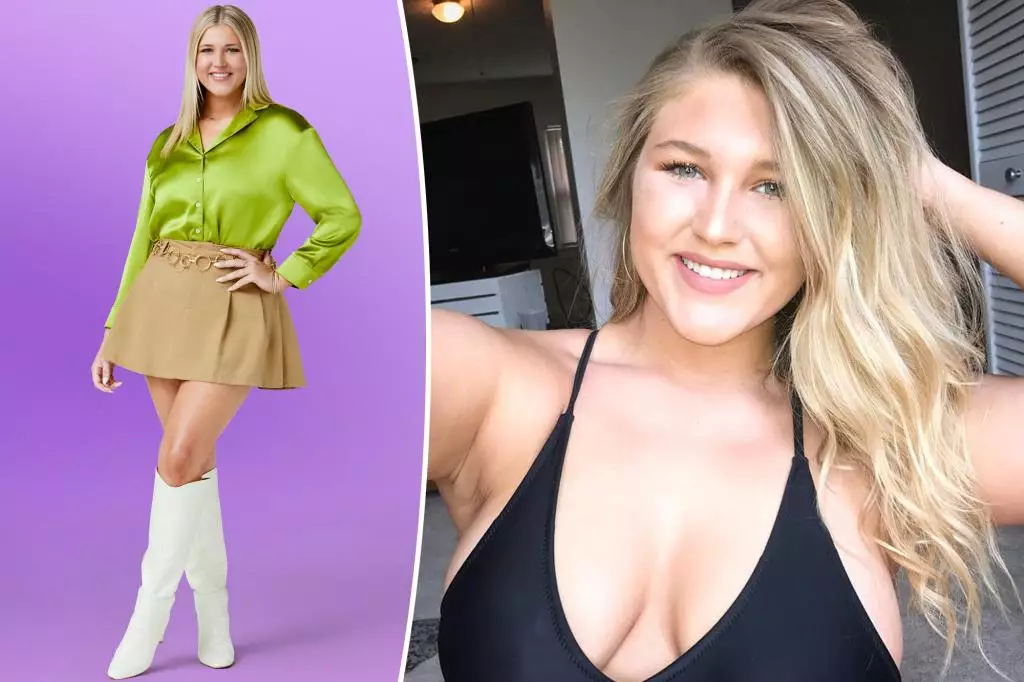Hannah Jiles, recognized from Season 7 of the hit Netflix reality show “Love Is Blind,” has taken a bold step to share her weight loss story with candid honesty. In a recent discussion with Us Weekly, she opened up about her transformative journey, revealing that her struggle with weight has been a long-standing battle very much influenced by her experiences within the harsh spotlight of reality television. Jiles’ story is one of self-exploration, the pursuit of better health, and a candid confrontation with prescribed beauty standards often glorified within the entertainment industry.
Like many individuals, Jiles’ weight fluctuations throughout her life were deeply tied to her mental health—a common thread in the narratives of many seeking solace in food. During the isolation that enveloped many during the COVID-19 pandemic, Jiles found herself tipping the scales at 220 pounds. In recounting this period, she expressed feelings of despair and helplessness, mirroring the turmoil faced by numerous others. Her admission that she was essentially “feeling sorry for herself” encapsulates a raw honesty often lacking when discussing weight loss; she wasn’t just fighting physical battles but emotional ones as well.
It is important to acknowledge the broader context in which these issues reside. The act of weight loss is sometimes oversimplified in popular culture, often reduced to a straightforward equation of calories in versus calories out. Jiles’ narrative complicates this view, revealing an emotional landscape where eating became a coping mechanism. Her journey, therefore, becomes not just a tale of numbers on a scale, but one concerning mental wellbeing, societal pressures, and personal growth—a multifaceted transformation.
As Jiles delves into her experiences with liposuction, she introduces yet another layer of complexity to her narrative. Having made the choice to undergo the procedure prior to appearing on “Love Is Blind,” Jiles reflects on her intention to alter aspects of her body she felt uncomfortable with. Such decisions often bring about a dichotomy of feelings; they can empower individuals to take control while simultaneously leading to discussions about self-image and the reliance on surgical solutions. Jiles’ experience speaks to a prevalent conflict where individuals desire acceptance yet feel perpetually dissatisfied, regardless of the changes they make.
Moreover, when speculation arose about her potential use of Ozempic—a medication that gained popularity for weight loss—Jiles did not shy away from addressing it candidly. Recognizing that everyone responds differently to such treatments, she offered an essential perspective on the experiences that come with trying to find a solution. The drug made her feel ill, ultimately leading her to prioritize her overall wellness over drastic solutions. This aspect of her story underlines an important point: weight loss journeys are highly personal, and what works for one person may not work for another.
Post-show, Jiles emphasized a transformed mindset centered around self-love and healthy living. With a current weight of 145 pounds, she describes a shift from solely focusing on appearance to prioritizing how she feels physically and mentally. The mental health aspect of her journey unfolded with the aid of anxiety medication, which played a role in reducing her emotional eating.
Her narrative suggests an awakening—one where personal health transcends physical appearance. Through simple, mindful changes and making conscious food choices, she advocates a balanced approach over perfectionism. She has embraced Pilates occasionally, which reflects the evolution of her connection with fitness; instead of viewing it as a chore, it becomes a choice grounded in self-care.
Hannah Jiles’ story transcends mere weight loss; it encapsulates resilience, self-discovery, and the importance of mental wellbeing. As more individuals share their personal journeys, it becomes increasingly vital to recognize that weight management is not linear and that health is multi-dimensional. The messages she imparts—of embracing oneself irrespective of societal beauty standards and recognizing the emotional undercurrents tied to our relationship with food—serve as a reminder that the path to personal transformation is often complex but profoundly rewarding. In showing us her truth, Jiles inspires others to confront their own struggles while fostering a community built on understanding and acceptance.

